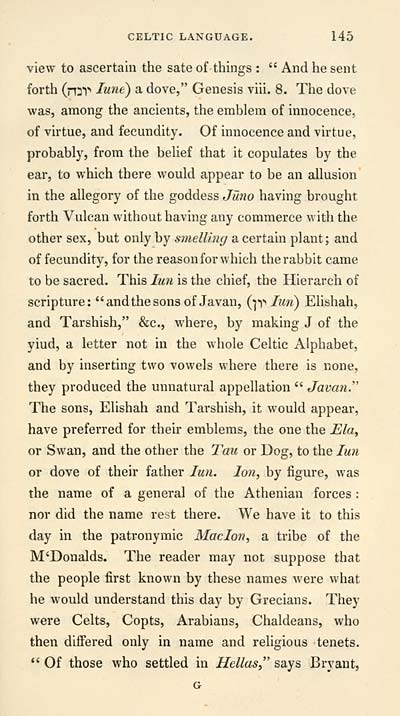Download files
Complete book:
Individual page:
Thumbnail gallery: Grid view | List view

CELTIC LANGUAGE. 145
view to ascertain the sate of things : " And he sent
forth (nai"^ lune) a dove," Genesis viii. 8. The dove
was, among the ancients, the emblem of innocence,
of virtue, and fecundity. Of innocence and virtue,
probably, from the belief that it copulates by the
ear, to which there would appear to be an allusion
in the allegory of the goddess Jmo having brought
forth Vulcan without having any commerce with the
other sex, but only by smelling a certain plant; and
of fecundity, for the reason for which the rabbit came
to be sacred. This lun is the chief, the Hierarch of
scripture: "andthesonsof Javan, ("jv /mw) Elishah,
and Tarshish," &;c., where, by making J of the
yiud, a letter not in the whole Celtic Alphabet,
and by inserting two vowels where there is none,
they produced the unnatural appellation " Javan^
The sons, Elishah and Tarshish, it would appear,
have preferred for their emblems, the one the jE/a,
or Swan, and the other the Tau or Dog, to the lun
or dove of their father lun. Ion, by figure, was
the name of a general of the Athenian forces :
nor did the name re:>t there. We have it to this
day in the patronymic Maclon, a tribe of the
M'Donalds. The reader may not suppose that
the people first known by these names were what
he would understand this day by Grecians. They
were Celts, Copts, Arabians, Chaldeans, who
then differed only in name and religious tenets.
*' Of those who settled in Hellas" says Bryant,
view to ascertain the sate of things : " And he sent
forth (nai"^ lune) a dove," Genesis viii. 8. The dove
was, among the ancients, the emblem of innocence,
of virtue, and fecundity. Of innocence and virtue,
probably, from the belief that it copulates by the
ear, to which there would appear to be an allusion
in the allegory of the goddess Jmo having brought
forth Vulcan without having any commerce with the
other sex, but only by smelling a certain plant; and
of fecundity, for the reason for which the rabbit came
to be sacred. This lun is the chief, the Hierarch of
scripture: "andthesonsof Javan, ("jv /mw) Elishah,
and Tarshish," &;c., where, by making J of the
yiud, a letter not in the whole Celtic Alphabet,
and by inserting two vowels where there is none,
they produced the unnatural appellation " Javan^
The sons, Elishah and Tarshish, it would appear,
have preferred for their emblems, the one the jE/a,
or Swan, and the other the Tau or Dog, to the lun
or dove of their father lun. Ion, by figure, was
the name of a general of the Athenian forces :
nor did the name re:>t there. We have it to this
day in the patronymic Maclon, a tribe of the
M'Donalds. The reader may not suppose that
the people first known by these names were what
he would understand this day by Grecians. They
were Celts, Copts, Arabians, Chaldeans, who
then differed only in name and religious tenets.
*' Of those who settled in Hellas" says Bryant,
Set display mode to: Large image | Transcription
Images and transcriptions on this page, including medium image downloads, may be used under the Creative Commons Attribution 4.0 International Licence unless otherwise stated. ![]()
| Early Gaelic Book Collections > Blair Collection > History of the Celtic language > (151) |
|---|
| Permanent URL | https://digital.nls.uk/76180270 |
|---|
| Description | A selection of books from a collection of more than 500 titles, mostly on religious and literary topics. Also includes some material dealing with other Celtic languages and societies. Collection created towards the end of the 19th century by Lady Evelyn Stewart Murray. |
|---|
| Description | Selected items from five 'Special and Named Printed Collections'. Includes books in Gaelic and other Celtic languages, works about the Gaels, their languages, literature, culture and history. |
|---|

